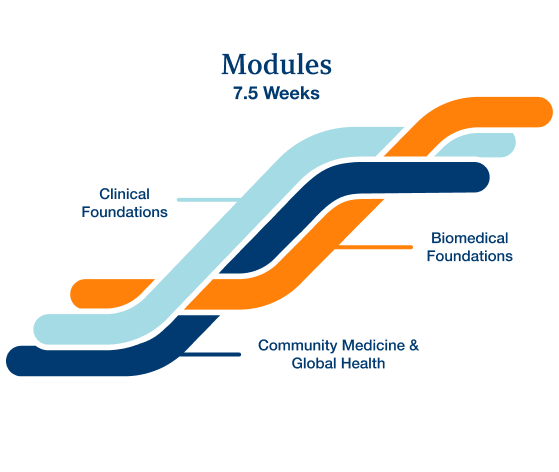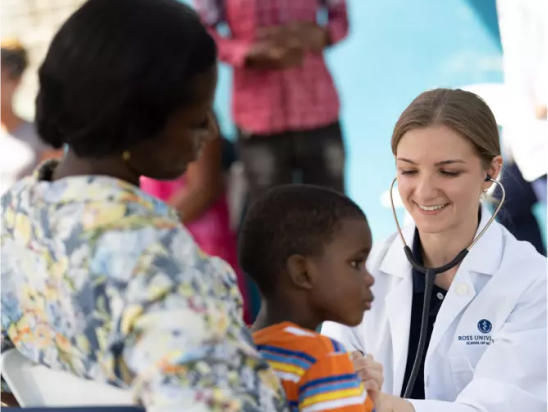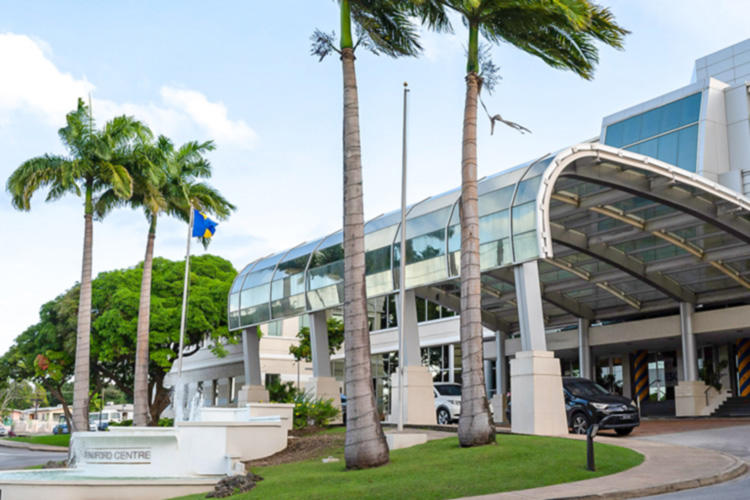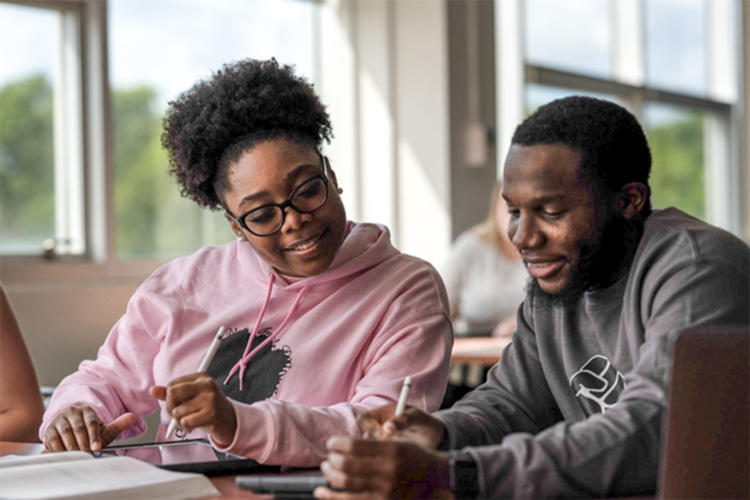Medical Sciences Curriculum
Your journey with Ross University School of Medicine (Ross Med) begins by building the foundational skills that will propel you to success as a med student. By the time you graduate, you’ll have gained a global perspective that will inform your career in medicine—wherever you plan to practice.
An Integrated Approach
Modeled after curricula used by medical schools in the United States, our Medical Sciences program is designed to help you understand and address health and disease holistically.
Through Ross Med’s enhanced five-semester organ-system-based modular curriculum, you will learn how the physiological, anatomical, and biochemical processes of each organ system work together simultaneously, providing you with an integrated view of human health in biomedical, clinical and community health contexts.
An active learning model designed to keep you engaged and promote learning, includes small group sessions and team-based learning with access to:
- Anatomical Sciences and Medical Imaging facility
- Simulation Institute*
- Standardized patient and interview skills training room
- Patient examination rooms with A/V links to classrooms
- More than 40 student clubs and organizations to network and gain additional hands-on experience while enriching classroom teachings
*Ross University School of Medicine’s Simulation Institute is accredited by the Society for Simulation in Healthcare (SSH, www.ssih.org) in the areas of Teaching/ Education, since November 2013.

Serving Communities Through Hands-On Experience
Engage in dynamic educational experiences and diverse learning opportunities while learning medicine through a global lens.
Hands-on training and experiences begin in your first semester at Ross Med. These integrated, clinically relevant activities are embedded in our preclinical curriculum, offering you opportunities to apply foundational and behavioral science knowledge to clinical care and engage with diverse patients across Barbados within weeks of beginning your classes.
Your early community experiences may include participation in:
- Mobile pop-up clinics
- Home visits
- Mental health facilities and outreach programs
- Pediatric clinics and local schools
- And more!

Research Foundations
All students will participate in community-based research beginning in their first semester. Your research will provide deeper understanding of the social determinants of health and health care needs of local communities. This research is threaded throughout all five semesters of the Medical Sciences curriculum.
You will learn:
- Research methods
- Data Collection and analysis
- Composing content
- Posters/presentations
Research
Methods
Data Collection
and Analysis
Composing
Content
Posters and
Presentations
Student Success and Support
At Ross Med, we are dedicated to helping you find success in your chosen career. As a Medical Sciences student, you’ll have access to state-of-the-art facilities, technology, and support from our faculty and staff throughout your studies.
Program Curriculum
During your first two years as a Ross Med student, you will complete our five-semester, 20-month medical sciences curriculum in Barbados before heading to the U.S. for your clinical rotations.
The pre-clinical curriculum includes ten 7.5-week modules focused on three themes: (1) biomedical foundations (BF), (2) clinical foundations (CF), and (3) community medicine and global health (CH).
View the academic catalog for full course descriptions.
Curriculum Modules
8 credits
During this introductory course, you’ll encounter the core concepts and skills needed for further systems-based learning and clinical encounters as you learn:
- The general principles of biochemistry, cell biology, genetics, and molecular biology. (BF)
- Communication and interviewing skills. (CF)
- The foundations of research and how to critically appraise medical literature. (CH)
Throughout this module, you’ll also learn about the theory and practice of five physical examinations and be exposed to real patients through a Community Health visit.
8 credits
Building on the previous module, Fundamentals and Foundations of Medicine 2 will further your development of core concepts and skills in medicine, including:
- The general principles of embryology, histology, pathology, pharmacology, and physiology. (BF)
- Key social science concepts and continued development of communication and interviewing skills. (CF)
- Continued practice with critically appraising medical literature and an introduction to the development of a research project. (CH)
During this course, you will become competent in three more complex physical examinations and encounter real patients through two Community Health visits.
8 credits
This module will provide you with a solid grounding in the normal and abnormal processes and disorders of the immune, blood, and lymphoreticular systems.
Using representative cases that will help you weave your biomedical knowledge into clinical frameworks, you will learn:
- The structure and function of these systems, along with the pathophysiology, clinical presentation, complications, diagnosis, prognosis, and treatment of patients with disorders or diseases affecting these systems. (BF)
- Clinical reasoning skills through small-group, problem-based learning activities focused on virtual patients. (CF)
- Essential public health topics. (CH)
Through this course, you will receive accredited training in Basic Life Support and certification from the American Heart Association®.
8 credits
This module begins with discussion of the normal microscopic anatomy and function of skin as well as the pathophysiology, diagnosis, and treatment of common dermatological conditions before moving on to the musculoskeletal system. This course includes:
- An introduction to medical entomology. (BF)
- An exploration of the origin and function of muscle, cartilage, and bone through virtual dissection of the back and limbs in a digital anatomy laboratory. (BF)
- Continued development of clinical reasoning skills using relevant cases. (CF)
- Discussion of a variety of topics around health inequity, improvements and innovation in healthcare, and another Community Health visit with real patients. (CH)
8 credits
The Cardiology module will provide you with a foundation in the normal processes and disorders of the cardiovascular system. It includes:
- Discussion of embryology, anatomy, and physiology of the heart, including activities in the virtual anatomy laboratory and activities focused on interpreting electrocardiograms. (BF)
- Simulated patient visits. (CF)
- Real patient interactions during a Community Health visit, as well as discussion of the epidemiology and effects of cardiovascular disease. (CH)
8 credits
This module concentrates on function and disorders of the respiratory and renal systems. During this course, you will:
- Explore the structure and function of the lung and kidney, including virtual dissection, and the connections between respiratory, renal, and cardiovascular systems and diseases. (BF)
- Learn how to address these issues through simulated patient visits. (CF)
Engage with real patients through a Community Health visit. (CH)
8 credits
In this course, you will explore the structure, function, and disorders of the gastrointestinal system, as well as clinically-relevant essentials of nutrition and diet-related disease. This includes:
- A virtual dissection of the abdomen and examination of the clinical presentation of metabolic diseases and nutritional deficiency. (BF)
- Refinement of your physical examination skills through simulated patient visits. (CF)
- Additional Community Health visits with the opportunity to engage with real patients. (CH)
8 credits
This module focuses on key clinically-relevant concepts around the endocrine and reproductive systems, including:
- An integrated discussion of normal and abnormal endocrine function and the complexity of endocrine diseases and treatment, as well as reproductive function, dysfunction, and treatment. (BF)
- Clinical application of knowledge through simulated patient visits. (CF)
- Screening and prevention of related diseases, implication of menopause, relationships between gender and health, and unplanned pregnancy. (CH)
8 credits
Through this course, you will learn about the organization, function, and disorders of the human nervous system, including:
- Discussions of neuroanatomical systems through a detailed virtual visualization and dissection of the head, neck, and brain. (BF)
- The application of principles of neuropharmacology in clinical psychiatry.
- Continued development of physical examination skills through a final simulated patient visit. (CF)
- The culmination of research foundations through a research paper and a final Community Health visit with real patients. (CH)
8 credits
This final module provides you with the opportunity to integrate your acquired competencies, medical knowledge, and clinical skills through complex and multi-organ system case presentations. Clinical vignettes will sharpen your clinical and analytical skills, preparing you for your Comprehensive Basic Science Examination (CBSE) and demonstrate your mastery of United States Medical Licensing Examination® (USMLE®) Step 1 Content Outline concepts.
Take The Next Step
Attend one of our enrollment events. Explore our MD program, learn about the admissions and interview process, and speak one-on-one with alumni and admissions representatives.
Get in contact with our team who will answer any and all of your questions about your next career.
Ready to apply to Ross University School of Medicine? There are five easy ways to start your application.


